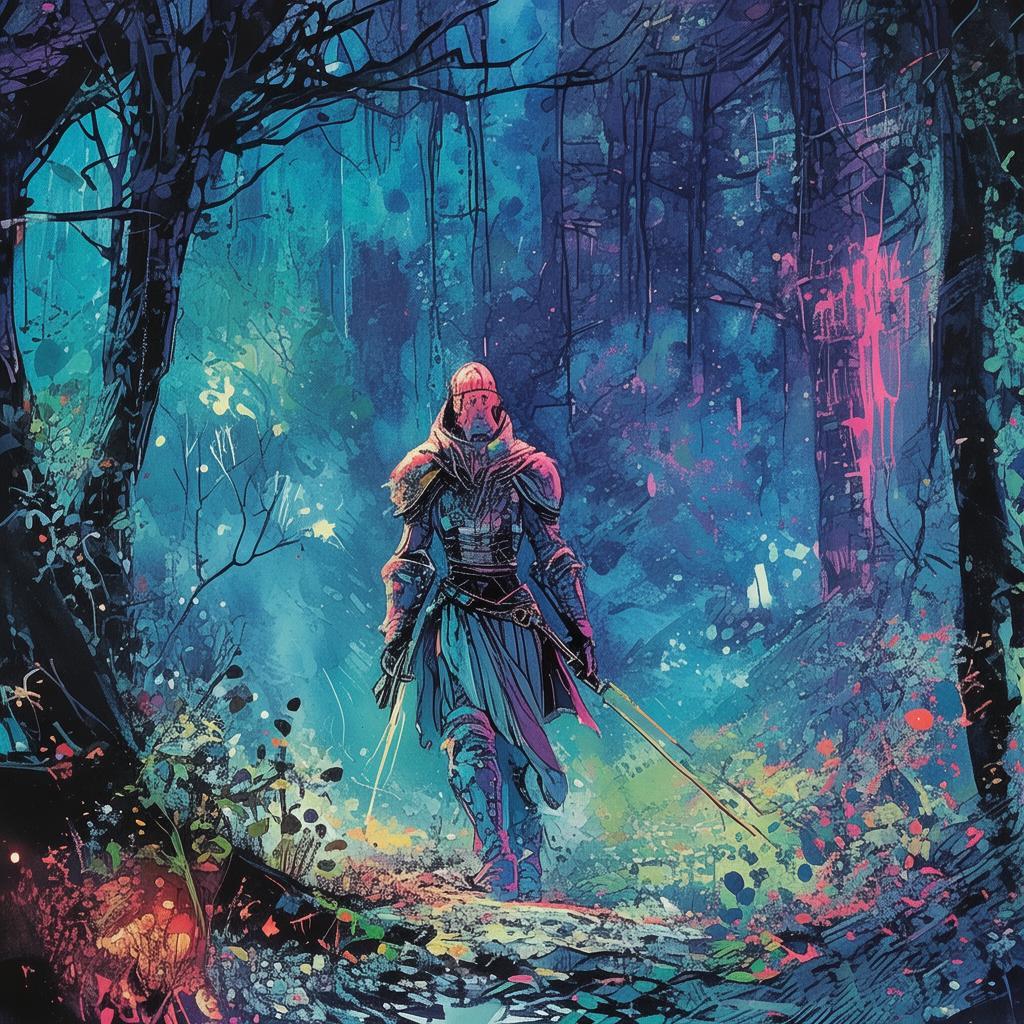The Puppeteer's Requiem: Echoes of Xinjiang's Curse
In the heart of Xinjiang, a land where the desert meets the mountains and ancient traditions blend with modernity, there stood a theater that was more than just a place of entertainment. It was a sanctuary where the spirits of the ancestors were honored, and where the art of shadow play was revered as a sacred ritual. The theater was ruled by a master puppeteer known as Ma Jun, whose skill with the strings was unmatched. His performances were a blend of myth and reality, and his puppets, brought to life by his deft fingers, were as real as the people who watched them.
Ma Jun was a man of many secrets, and one of the most profound was the curse that bound him to his art. It was said that the night he first took up the strings, he had been visited by an old man with eyes like the desert sky and a voice like the howling wind. The old man had spoken of a debt that Ma Jun's ancestors had incurred, a debt that could only be repaid through the puppeteer's art. But the cost was steep; as long as he wielded the strings, he would be haunted by the spirits of the past, bound to the shadows until the debt was settled.

The curse followed Ma Jun through years of fame and fortune. His shadow plays were a marvel to all who witnessed them, and his legend grew as wide as the Great Wall. Yet, despite the acclaim, Ma Jun felt the weight of the curse pressing down on him, a weight that seemed to grow heavier with each passing day.
One fateful evening, as the moon hung low in the sky and the wind whispered through the alleyways, a young girl named Li Xin wandered into the theater. She was a wanderer, lost in the vastness of Xinjiang, seeking answers to questions that haunted her soul. As she watched the shadow play, she felt an inexplicable connection to the puppets, as if they were her own reflections, trapped in a dance of fate.
Li Xin approached Ma Jun after the play, her eyes reflecting the curiosity and sorrow that had followed her since childhood. "I have seen your performances, Master Ma," she said, her voice barely above a whisper. "They are beautiful, but they also carry a weight of sadness. What is this curse you speak of?"
Ma Jun looked at Li Xin with eyes that held the wisdom of the ages. "The curse is not mine alone," he replied. "It is a debt owed to the ancestors, a debt that binds us all to the shadows. Until it is repaid, we are all puppets, dancing to the tune of the past."
Li Xin's heart ached with the realization that she was not just a witness to the shadow play but a participant in it. She knew that she had to uncover the truth behind the curse, to free not just Ma Jun but herself as well.
The two of them began a journey that would take them deep into the heart of Xinjiang, through deserts and mountains, into the lives of the people, and through the annals of history. They discovered that the curse was not just a personal burden but a reflection of the suffering that had befallen Xinjiang's people over the centuries.
As they delved deeper, they uncovered a hidden truth: the curse was a symbol of the resilience and strength of the people of Xinjiang. It was a reminder that even in the darkest times, hope could be found in the shadows, and that the past could be a teacher, guiding the future.
Li Xin and Ma Jun's journey led them to a forgotten temple deep in the mountains, where the ancestors were said to reside. There, amidst the whispering winds and the glow of ancient lanterns, they found the key to unlocking the curse. It was a scroll, written in an ancient script, that spoke of a ritual that could release the spirits from their eternal dance.
The ritual was perilous, and it required the sacrifice of something precious to Ma Jun. As the final incantation was spoken, the shadows began to stir, and the spirits of the ancestors emerged from the darkness. They surrounded Ma Jun, their eyes filled with gratitude and sorrow. Then, with a final, poignant gesture, they vanished, leaving behind a sense of peace and fulfillment.
Ma Jun felt the weight of the curse lift from his shoulders, and he knew that his debt had been repaid. He looked at Li Xin, whose eyes were brimming with tears of joy and relief. "Thank you," he said, his voice trembling.
Li Xin smiled, her face alight with the glow of a new beginning. "We have all been freed, Master Ma. The curse was a reminder that we are all connected, that our past shapes our future."
With the curse unraveled, Ma Jun returned to his theater, but this time, his performances were different. They were no longer just stories of the past but a celebration of life, of the beauty and resilience of the human spirit. And Li Xin, the wanderer who had once been lost, found her place in the tapestry of Xinjiang's history, her story now woven into the fabric of the land.
The Puppeteer's Requiem: Echoes of Xinjiang's Curse is a tale of debt, redemption, and the enduring power of the human spirit. It is a story that will resonate with anyone who has ever felt bound by the past, reminding us that the true strength lies in our ability to overcome our shadows and embrace the light.
✨ Original Statement ✨
All articles published on this website (including but not limited to text, images, videos, and other content) are original or authorized for reposting and are protected by relevant laws. Without the explicit written permission of this website, no individual or organization may copy, modify, repost, or use the content for commercial purposes.
If you need to quote or cooperate, please contact this site for authorization. We reserve the right to pursue legal responsibility for any unauthorized use.
Hereby declared.









